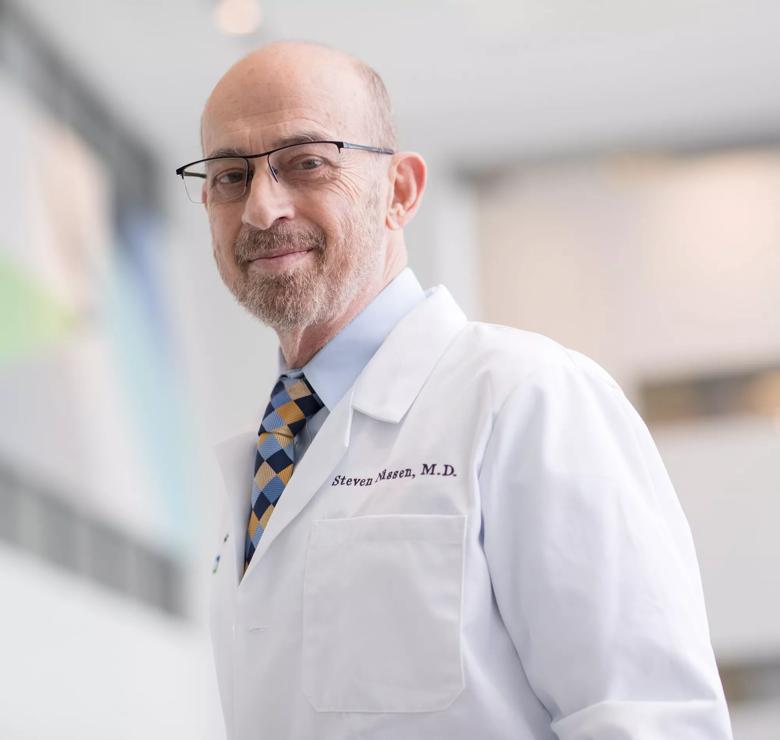TRAVERSE Trial researchers still urge caution when using testosterone-replacement therapy for patients
Content is property of Cleveland Clinic and for news media use only.

A Cleveland Clinic-led trial found that testosterone-replacement therapy did not result in a higher incidence of major adverse cardiac events in middle-aged and older men with hypogonadism (also known as low testosterone) who also had preexisting or a high risk of cardiovascular disease. However, researchers still urge caution when considering testosterone therapy.
Results from the Testosterone Replacement Therapy for Assessment of Long-term Vascular Events and Efficacy Response in Hypogonadal Men (TRAVERSE) trial were presented today during a late-breaking science session at ENDO 2023, the Endocrine Society’s annual meeting, and simultaneously published in the New England Journal of Medicine.

Image content: This image is available to view online.
View image online (https://assets.clevelandclinic.org/transform/1d0b8db6-c98a-42b1-a699-d37182807610/nissen-steve-074-e1605303442379_jpg)
Steven Nissen, M.D.
“Although the trial showed some evidence that testosterone treatment may be safe for men with low levels of testosterone, these findings should not be used as a justification for widespread prescription of these products to large numbers of men,” said senior author Steven Nissen, M.D., Chief Academic Officer of the Heart, Vascular & Thoracic Institute at Cleveland Clinic.

Image content: This image is available to view online.
View image online (https://assets.clevelandclinic.org/transform/e076aed2-e5ed-4ffd-b3a1-f903f3e716f9/Lincoff_Michael_jpg)
Michael Lincoff, M.D.
“Because testosterone deficiency is not a life-threatening condition, uncertainty about cardiovascular outcomes has weighed on treatment decisions by clinicians and patients,” said Michael Lincoff, M.D., TRAVERSE’s lead author and vice chair for research in the Cleveland Clinic Department of Cardiovascular Medicine. “Our findings may facilitate a more informed consideration of the potential benefits and risks of testosterone therapy among middle-aged and older men with hypogonadism.”
The issue of low testosterone, or “low T,” for aging men has been a growing topic in today’s society. A study published in JAMA Internal Medicine showed prescriptions for testosterone therapy tripled between 2001 and 2011 for men over 40.
In response to concerns and conflicting data regarding the cardiovascular safety of testosterone-replacement therapy, the Food and Drug Administration (FDA) initiated a review in 2010 after a small placebo-controlled trial was discontinued because of an increased incidence of cardiovascular events among patients who received testosterone therapy. The FDA review showed that many men are treated with testosterone products even though their testosterone blood levels have never been checked.
In 2015, the FDA required the makers of testosterone products to “conduct a well-designed clinical trial to more clearly address the question of whether an increased risk of heart attack or stroke exists” for men who take testosterone products.
The TRAVERSE trial was designed to address this FDA mandate. The randomized, double-blind, placebo-controlled trial was conducted at 316 clinical-trial sites in the United States and enrolled 5,246 men 45 to 80 years of age who had preexisting or a high risk of cardiovascular disease and who reported symptoms of hypogonadism.
Patients were randomly assigned to receive daily 1.62% testosterone gel or placebo gel through the skin. Investigators primarily looked at the time to a composite of death from cardiovascular causes, nonfatal heart attack, or nonfatal stroke.
Results showed that among 5,198 patients who received testosterone or placebo for a mean duration of 22 months, testosterone-replacement therapy did not cause more major cardiac events than placebo. A major cardiac event occurred in 182 patients (7.0%) in the testosterone group and in 190 patients (7.3%) in the placebo group. However, those receiving testosterone did show a higher incidence of atrial fibrillation, acute kidney injury, and issues arising from blood clots in the veins. Current guidelines recommend that testosterone should be used with caution in men who have had previous blood clots.
“The TRAVERSE Study is the largest trial of testosterone replacement therapy in men with hypogonadism,” said Dr. Shalender Bhasin, a Co-Principal Investigator of the TRAVERSE Study at Brigham and Women’s Hospital. “These findings do not justify testosterone treatment of men who do not have hypogonadism, and they should not be used to imply that large doses misused by athletes and bodybuilders are safe.”
Men with low testosterone should not attempt to treat it without the help of a medical professional. “The market is booming with so-called ‘natural’ testosterone boosters, and men need to be careful,” said Dr. Nissen. “These products have not been evaluated in rigorous clinical trials and they have not been approved by the FDA to treat low testosterone levels.”
The TRAVERSE trial was sponsored by a consortium of testosterone manufacturers and was overseen by the Cleveland Clinic Coordinating Center for Clinical Research (C5Research) with support from a contract research organization (Labcorp Drug Development). The trial protocol was designed by the executive committee and sponsor. The clinical database was maintained by Labcorp Drug Development and transferred to C5Research for independent statistical analyses.
Sub-studies of the TRAVERSE Trial examining effects of testosterone treatment on prostate cancer, sexual function, and anemia led by Dr. Shalendar Bhasin at Brigham and Women’s Hospital will also be presented at the Endocrine Society meeting.
Dr. Lincoff has overseen clinical trials for AbbVie, AstraZeneca, CSL Behring, Eli Lilly, Esperion, Novartis and Novo Nordisk and has received consulting fees from Akebia, Ardelyx, Becton-Dickson, Eli Lilly, Endologix, Fibrogen, Glaxo-SmithKline, Medtronic, Neovasc, Novo Nordisk, Provention Bio, and ReCor.
Dr. Nissen has served as a consultant for many pharmaceutical companies and has overseen clinical trials for Amgen, AstraZeneca, Cerenis, Eli Lilly, Novartis, Novo Nordisk, The Medicines Company, Orexigen, Takeda and Pfizer. However, he does not accept honoraria, consulting fees or other compensation from commercial entities.
Video content: This video is available to watch online.
View video online (//www.youtube.com/embed/0Ky2knW4CTI)
YouTube video player
Cleveland Clinic is a nonprofit multispecialty academic medical center that integrates clinical and hospital care with research and education. Located in Cleveland, Ohio, it was founded in 1921 by four renowned physicians with a vision of providing outstanding patient care based upon the principles of cooperation, compassion and innovation. Cleveland Clinic has pioneered many medical breakthroughs, including coronary artery bypass surgery and the first face transplant in the United States. Cleveland Clinic is consistently recognized in the U.S. and throughout the world for its expertise and care. Among Cleveland Clinic’s 82,600 employees worldwide are more than 5,786 salaried physicians and researchers, and 20,700 registered nurses and advanced practice providers, representing 140 medical specialties and subspecialties. Cleveland Clinic is a 6,728-bed health system that includes a 173-acre main campus near downtown Cleveland, 23 hospitals, 280 outpatient facilities, including locations in northeast Ohio; Florida; Las Vegas, Nevada; Toronto, Canada; Abu Dhabi, UAE; and London, England. In 2024, there were 15.7 million outpatient encounters, 333,000 hospital admissions and observations, and 320,000 surgeries and procedures throughout Cleveland Clinic’s health system. Patients came for treatment from every state and 112 countries. Visit us at clevelandclinic.org. Follow us at x.com/CleClinicNews. News and resources are available at newsroom.clevelandclinic.org.
Editor’s Note: Cleveland Clinic News Service is available to provide broadcast-quality interviews and B-roll upon request.